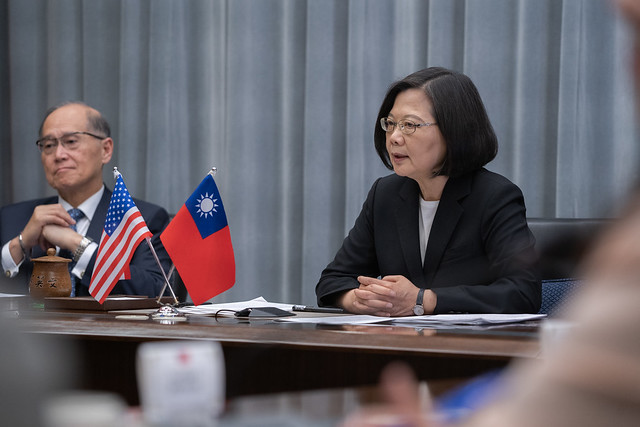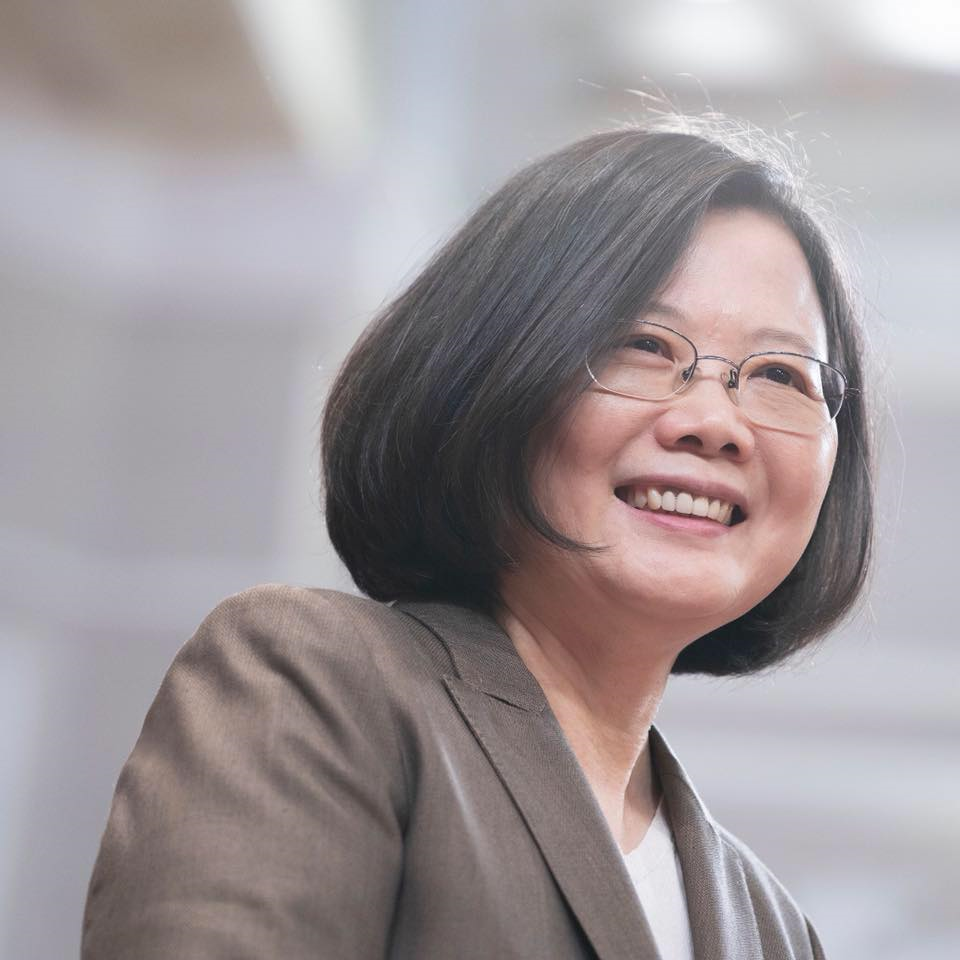Taiwan president: Agreement with US a force for good across the world

President Tsai Ing-wen delivers her keynote speech during the videoconference with three US think tanks. PHOTO courtesy of the Press Division of Taipei Economic and Cultural Office in the Philippines
Taiwan President Tsai Ing-wen cited the benefits and advantages of an agreement Taiwan signed with the United States 40 years ago, saying it has become a force for good across the world.
Tsai was referring to the Taiwan Relations Act (TRA), which according to her, opened a new chapter in Taiwan-US relations.
Tsai talked on the achievements that have resulted from the TRA when she attended a videoconference from the Presidential Office with key US political figures and scholars on April 9, at the joint invitation of three US think tanks–the Center for Strategic and International Studies (CSIS), the Brookings Institution, and the Woodrow Wilson International Center for Scholars (Wilson Center).
The videoconference was moderated by Ambassador Richard Armitage, former US Deputy Secretary of State, and hosted by Senior Vice President for Asia and Japan Chair Dr. Michael Green. After her keynote speech, President Tsai responded questions from Ambassador Armitage; Dr. Richard Bush, Brookings Institution Chen-Fu and Cecilia Yen Koo Chair in Taiwan Studies; Mr. Abraham Denmark, Director of the Asia Program at the Wilson Center; and Ms. Bonnie Glaser, Director of the China Power Project at CSIS, before giving closing remarks.

Taiwan president Tsai Ing-wen. PHOTO from Press Division, TECO
Excerpts from President Tsai’s keynote speech:
Article continues after this advertisement“The momentous events that led to the swift passage of the TRA forty years ago marked a difficult time in Taiwan’s history. Many, both in the United States and here in Taiwan, were not optimistic about Taiwan’s future – or not clear as to whether that future could remain distinct from that of across the Strait.
Article continues after this advertisement“Few could have imagined that the foresight and friendship shown by the drafters of the TRA would eventually allow this relationship to blossom again, this time based on our shared values.
“And few could have imagined that the Taiwan-US partnership would become stronger than ever, and a force for good across the world.
“What the TRA also reflects, is the United States’ commitment to our shared interests of peace, security, and stability in the Pacific. It has supported Taiwan’s development of the defense capabilities that we need, in order to resist any form of coercion.
“With the benefit of hindsight from 40 years of experience, I trust that everyone here today agrees that the TRA has helped create a force for good, and laid the foundations for Taiwan to become a beacon of democracy in the world.
“Taiwan survived the challenges posed to us by history. We were not defeated. We are an island of resilience. And we have been working tirelessly to contribute to a brighter tomorrow for our region, and the world as well.”
President Tsai said that while “we commemorate the achievements of the TRA, but we should also recommit ourselves to our shared values, and common sense of purpose.”
She said foremost among them is ensuring that Taiwan’s global partnerships remain strong, particularly the special bond between Taiwan and the US.
Framework for security
In terms of security, Tsai said the TRA laid out a framework not only to “provide Taiwan with arms of a defensive character,” but also “to consider any effort to determine the future of Taiwan by other than peaceful means, including by boycotts or embargoes, a threat to the peace and security of the Western Pacific area and of grave concern to the United States.”
“Cooperation between our two countries has continued to fulfill the spirit of these articles. Already, a steady drumbeat of arms sales have been announced by the current US administration, and we have more in the pipeline,” she added.
According to her, the US has also continued to support the development of indigenous capabilities that Taiwan is capable of building here in Taiwan.
“But all of this only works when Taiwan is capable and determined to defend ourselves. We can’t expect others to do what we are not willing to do by ourselves. So since 2016, part of my primary goals is to strengthen our defense capabilities,” Tsai said.
“We are making these investments not because we pursue confrontation. Quite the opposite. Our intention is to uphold the spirit of the Taiwan Relations Act, and provide for lasting peace across the Taiwan Strait. But we can’t do this when we don’t have the ability to deter coercion and aggression,” she explained.
Unprecedented challenge
In her speech, Tsai also talked about China’s engagement in “a relentless campaign to deny our right to participate in international affairs. They don’t do this because it is a DPP administration, or because we don’t recognize the 1992 consensus. They do it, because they genuinely believe that the people of Taiwan don’t have an independent right to participate in global affairs.”
“That is troubling and destabilizing for the healthy development of cross-strait relations,” she said.
She pointed out that “one thing that we learned from the previous century is that the forward march of democracy is not a given.”
“Even as we speak, forces working against freedom and democracy are becoming more active around the world. For while we measure progress in terms of freedom and individual liberty, the metrics they use are fear and control, both at home and abroad.”
Given the traditional and non-traditional challenges facing us today, Tsai said the need for a collective response has never been clearer. “And Taiwan is ready, willing, and able to do our part to achieve our shared vision.”
At this critical moment, Tsai stressed that “it is more important than ever to ensure that the letter and spirit of the TRA prevail, and that the values we share continue to shape the future of our region.”
“With your support, we will continue to remind the world that Taiwan is an irreplaceable force for good in the world,” Tsai concluded. /jpv
RELATED STORY